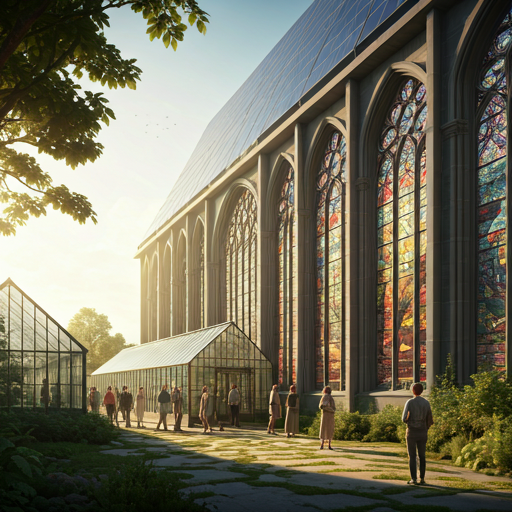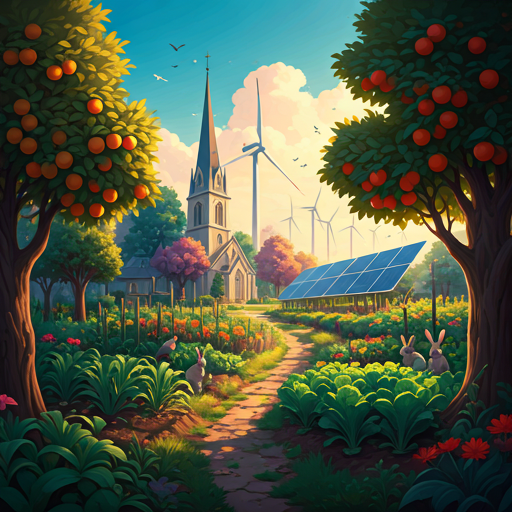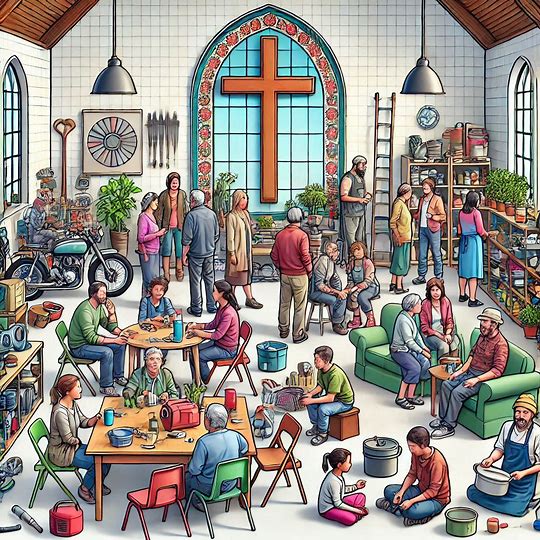Solarpunk Church
written December 29, 2024 | updated November 16, 2025
Could revitalizing the church, strengthening communities, and saving the planet all be related?
Note: this article is tailored to a Western, Jesus-following audience.
I've been in the church my whole life and a tech nerd just as long. My early memories of dancing at the altar are next to my early memories of PC gaming. Tragically, my faith and my passion for technology have almost never intersected.
That has yet to change, but I hope it does soon.
Putting solarpunk next to church will undoubtedly terrify some. But the last few months, it's had my imagination going absolutely wild. If there is any impetus to consider how we might better love our neighbors, bring people into fellowship, use everyone's gifts, and steward our Earth and resources, read on.

Some honest questions
First, let's squeeze some brain juice.
- Which little-reached demographics might be reached by a church with sustainability initiatives?
- Has your church been afraid of addressing environmental ethics because of political tensions?
- What might ministries look like where electronics, ecology, and ethics intersect with neighbors growing and fixing things together?
- Has your church considered the relationship between social and environmental justice? And the Scriptural mandates for both? What if there were easy ways to start doing more in those spaces?
- What if the structures supporting church operations today are insufficient for bearing good fruit in the quality and quantity which they ought? How might God prune? What better ways might exist?
- Western Christians are gradually becoming comfortable with a corporeal view of resurrection and eternity. Does this have implications for how we steward the Earth today?
- Technology shapes our society. Do we have doctrines deeper than social media guilt-trips? What might it look like to give technology and technologists a more meaningful place in ministry?
Jesus and...solarpunk?
Ok, brace for an un-churchy thesis: Churches are poised to be epicenters of community sustainability and mutual aid initiatives.
At one level, solarpunk is a flavor of fiction, like steampunk. But it's also a movement. One solarpunk manifesto reads
Solarpunk is a movement in speculative fiction, art, fashion, and activism that seeks to answer and embody the question "what does a sustainable civilization look like, and how can we get there?"... Solarpunk is at once a vision of the future, a thoughtful provocation, a way of living and a set of achievable proposals to get there.
To put this back in church terms, solarpunk is about restoring stewardship of the earth. The path there involves community, technology, and creativity. It's a dream of making the world a better place community by community, not just for the rich and powerful--sound a lot like something else? Of course, solarpunk alone will leave communities wanting without Jesus, but what if Jesus' kingdom is extraordinarily compatible to the solarpunk vision?
If Jesus is the prototypical new human ("firstborn from among the dead", 1 Colossions 1:18), then the church should strive to be new-creation-style community. Why shouldn't churches help lead communities into a more just, healthier, more sustainable future? What if the church needs solarpunk as much as solarpunk needs the church?
For me, biblical garden poetry feels at home with a backdrop of sprawling tech-enabled gardens and solar-powered sanctuaries. Who knows what the new Jerusalem will look like? For today, though, let's find the next first step.

What are you actually suggesting?
Here are a few tangible ideas, by no means exhaustive:
- Fix stuff instead of throwing it away, from leggings to lamps. (Heard of a repair cafe?)
- Grow and recover food.
- Create spaces for sustainability-focused creativity, from building community websites to hydroponics to recycling.
- Host an easily accessibly community fridge (or freedge).
More generally:
- Directly address needs (clothing, food, shelter) of people in the community.
- Share tools, knowledge, time, and space for all the above.
- Connect with and empower local organizations already doing these things.
- Get better utilization of church buildings and land.
Many of these suggestions are associated with mutual aid, which focuses on community cooperation rather than charity, which assumes inequity and is often patronizing.
Is this a false gospel?
There's no replacement for Jesus and his kingdom. And there's no proposed addenda for Scripture here.
There is a risk to be stated in that solarpunk perhaps has the makings of a religion in itself. Some today may follow it as such, finding their purpose and meaning in it. It could become an idol and a distraction for the Church. But so could most anything else.
Are you just trying to be relevant?
Trying to make the church relevant by talking about something when that something is questionably relevant to the church's mission is a problem. But there are strong theological justifications for the inherent relevance of sustainability (environmental stewardship) and community-based initiatives. In many senses, these ideas are intertwined with the story of the Bible from the garden to the early church to the new earth.
But is this really ministry?
The easy rhetorical response is something like, "Should the church have a food pantry?". But I'll admit I'd rather not get into detail arguing about church priorities.
A church can only prioritize so many things and have so many ministries. But one of the key pieces of the solarpunk movement is community involvement. Yes, I hope you'll consider enabling new ministries, but I'm also imagining empowering people already in your church in new ways and involving others in the community who might never have set foot in your church.

But...why though?
I think this question will be a legimate obstacle if you suggest a community garden or a tool library or a repair cafe or a free fridge to your church. Ultimately, the right answers will have to suit your context and the gifts and interests there.
For me, the opportunity to pursue a biblical calling directly through technology and in my community is something I never dreamed possible. Call me basic but I can't help feeling like maybe I was made for "such a time as this" (Esther 4:14).
For now, my goal is to make you think. To conclude, here are some verses to consider.
God blessed them and said to them, "Be fruitful and increase in number; fill the earth and subdue it. Rule over the fish in the sea and the birds in the sky and over every living creature that moves on the ground." (Genesis 1:28 NIV)
The Lord God took the man and put him in the Garden of Eden to work it and take care of it. (Genesis 2:15 NIV)
If my people, who are called by my name, will humble themselves and pray and seek my face and turn from their wicked ways, then I will hear from heaven, and I will forgive their sin and will heal their land. (2 Chronicles 7:14 NIV)
"Build houses and settle down; plant gardens and eat what they produce. Marry and have sons and daughters; find wives for your sons and give your daughters in marriage, so that they too may have sons and daughters. Increase in number there; do not decrease. Also, seek the peace and prosperity of the city to which I have carried you into exile. Pray to the Lord for it, because if it prospers, you too will prosper." (Jeremiah 29:5-7 NIV)
What is mankind that you are mindful of them, human beings that you care for them? You have made them a little lower than the angels and crowned them with glory and honor. You made them rulers over the works of your hands; you put everything under their feet: all flocks and herds, and the animals of the wild, the birds in the sky, and the fish in the sea, all that swim the paths of the seas. (Psalm 8:4-8 NIV)
The whole earth is filled with awe at your wonders; where morning dawns, where evening fades, you call forth songs of joy. You care for the land and water it; you enrich it abundantly. The streams of God are filled with water to provide the people with grain, for so you have ordained it. You drench its furrows and level its ridges; you soften it with showers and bless its crops. You crown the year with your bounty, and your carts overflow with abundance. The grasslands of the wilderness overflow; the hills are clothed with gladness. The meadows are covered with flocks and the valleys are mantled with grain; they shout for joy and sing. (Psalm 65:8-13 NIV)
"The Spirit of the Lord is on me, because he has anointed me to proclaim good news to the poor. He has sent me to proclaim freedom for the prisoners and recovery of sight for the blind, to set the oppressed free, to proclaim the year of the Lord's favor." (Luke 4:18-19 NIV)
They devoted themselves to the apostles' teaching and to fellowship, to the breaking of bread and to prayer. Everyone was filled with awe at the many wonders and signs performed by the apostles. All the believers were together and had everything in common. They sold property and possessions to give to anyone who had need. Every day they continued to meet together in the temple courts. They broke bread in their homes and ate together with glad and sincere hearts, praising God and enjoying the favor of all the people. And the Lord added to their number daily those who were being saved. (Acts 2:42-47 NIV)
For the creation waits in eager expectation for the children of God to be revealed. For the creation was subjected to frustration, not by its own choice, but by the will of the one who subjected it, in hope that the creation itself will be liberated from its bondage to decay and brought into the freedom and glory of the children of God. We know that the whole creation has been groaning as in the pains of childbirth right up to the present time. (Romans 8:19-22 NIV)